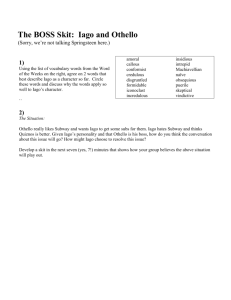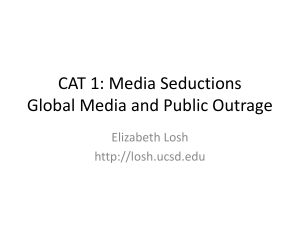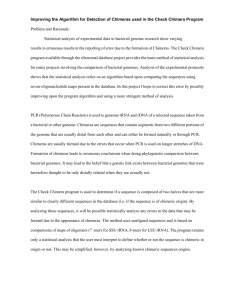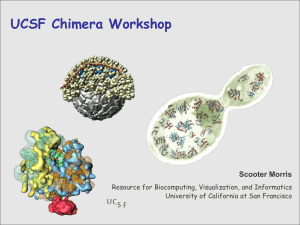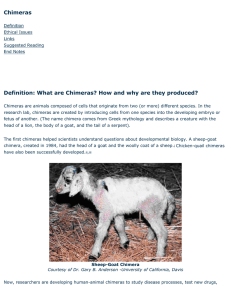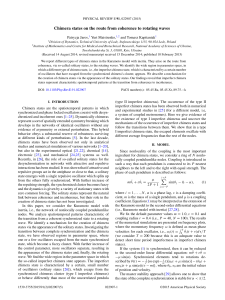Slides - Elizabeth Losh
advertisement
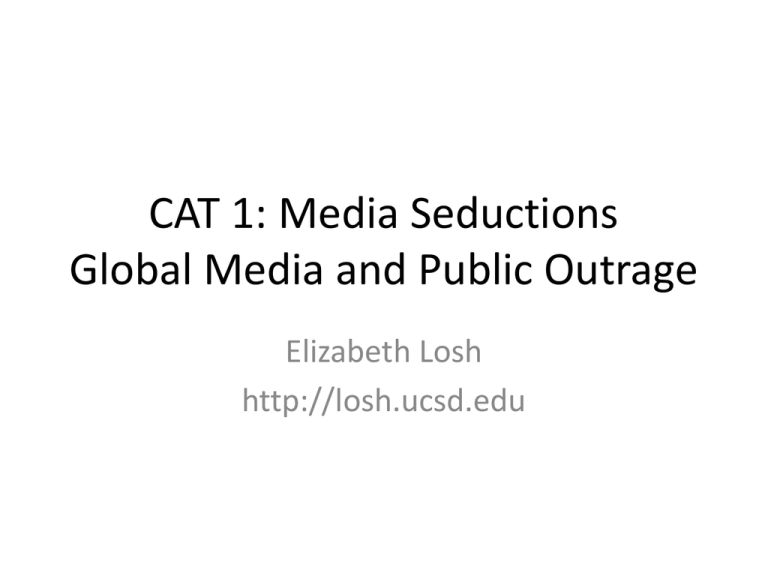
CAT 1: Media Seductions Global Media and Public Outrage Elizabeth Losh http://losh.ucsd.edu How’s My Driving? Don’t forget to complete the CAPE survey! Science Studies How is CAT 2 different from CAT 1? • Even more writing intensive • Focuses on the present of culture, art, and technology rather than the past • Curriculum focuses on arguments: explicit and implicit Special Guest Professor Gerald Doppelt Explaining the Controversy May Involve Getting Beyond It Getting beyond simple pro and con positions Is it really just about free speech vs. religious tolerance? Thinking About Layout Visualizing Your Exhibition What themes does the book explore other than media influence & blasphemy? How Do We Finish the Book? How do we understand Rushdie’s ideas about “imaginary homelands”? Thinking some more about media about media How do we think about media and deceit? Understanding the Iago story: narratives of temptation Understanding “blasphemy” in context Chamcha’s Predicament ‘When you’ve fallen from the sky, been abandoned by your friend, suffered police brutality, metamorphosed into a goat, lost your work as well as your wife, learned the power of hatred and regained human shape, what is there left to do but, as you would no doubt phrase it, demand your rights?’ (416) A Symbol of Hybridity: The Chimera 195 “the avatar of a chimerical archangel” 207 “the chimera of renewal” 311 “the effort of raising him . . . fully persuaded her that he was no chimera.” 382 “chimeras of form, lionheaded goatbodied serpenttailed impossibilities” 420 “a chimera with roots” 477 “a garden of dense intertwined chimeras” A Book about Media Tabloids (422) -- earlier we hear about “papers full of kinky sex and death” (354) Gibreel as a medium “scrawl his name in Gibreel’s flesh” (448) Art cinema vs. Indian cinema (454) Television cameras capturing the Club Hot Wax raid (469-470) “A camera requires law, order, the thin blue line.” “Film instead of human beings” (527) “A book is a product of a pact with the Devil” (474) Writing and Deceit After that, when he sat at the Prophet’s feet, writing down rules rules rules, he began, surreptitiously, to change things. ‘Little things at first. If Mahound recited a verse in which God was described as all-hearing, all-knowing, I would write, all-knowing, all-wise. Here’s the point: Mahound did not notice the alterations. So there I was, actually writing the Book, or rewriting, anyway polluting the word of God with my own profane language.’ (379-380) People write to tell lies. (398) Speech and Deceit Chamcha’s telephone calls 457-461 ‘The archangel sings to me,’ she admitted, ‘ to the tune of popular hit songs.’ (512) Useful and well-timed revelations (377) The Iago Story in Othello “worth the total output of any other dramatist” (412) “the enigma of Iago” (439) “that’s a fable” (481) Religion and Blasphemy Why do variations of the word “blasphemy” keep appearing? Inversions of brothel and religious space (394, 396) 2005 Jyllands-Posten Controversy about “the face of Muhammad” How did images in one Danish newspaper affect the world? How do political cartoons influence? Piss Christ (1987) Andres Serrano Caused controversy for the National Endowment for the Arts The Last Temptation of Christ (1988) Martin Scorsese http://www.youtube.com/watch?v=Toe-rDrS_Gw& Rushdie as Public Intellectual Comments after 9/11 Arguing against Samuel Huntington’s 1993 “Clash of Civilizations” argument in an October 4, 2001 article in The Nation “The Clash of Ignorance” The basic paradigm of West versus the rest (the cold war opposition reformulated) remained untouched, and this is what has persisted, often insidiously and implicitly, in discussion since the terrible events of September 11. The carefully planned and horrendous, pathologically motivated suicide attack and mass slaughter by a small group of deranged militants has been turned into proof of Huntington's thesis. Who represents Islam? “Let’s Get Back to Life” The Guardian, October 6, 2001 The fundamentalist believes that we believe in nothing. In his world-view, he has his absolute certainties, while we are sunk in sybaritic indulgences. To prove him wrong, we must first know that he is wrong. We must agree on what matters: kissing in public places, bacon sandwiches, disagreement, cutting-edge fashion, literature, generosity, water, a more equitable distribution of the world's resources, movies, music, freedom of thought, beauty, love. These will be our weapons. Not by making war, but by the unafraid way we choose to live shall we defeat them. “Let’s Get Back to Life” The Guardian, October 6, 2001 The terrorist wraps himself in the world's grievances to cloak his true motives. Whatever the killers were trying to achieve, it seems improbable that building a better world was part of it. The fundamentalist seeks to bring down a great deal more than buildings. Such people are against, to offer just a brief list, freedom of speech, a multi-party political system, universal adult suffrage, accountable government, Jews, homosexuals, women's rights, pluralism, secularism, short skirts, dancing, beardlessness, evolution theory, sex. These are tyrants, not Muslims. . Imaginative Acts of Response “how different bits of the world join up” Pseudo-Interactivity Rushdie’s Criticisms of Clicker Culture His was a generation that believed in skipping life’s boring, troublesome, unlikable bits, going fastforward from one action-packed climax to the next. (416) . . . what a leveler this remote-control gizmo was, a Procrustean bed for the twentieth century; it chopped down the heavyweight and stretched the slight (419) No wonder we are unable to remain focused on anything for very long; no wonder we invent remotecontrol channel-hopping devices. If we turned these instruments upon ourselves we’d discover more channels than a cable or satellite mogul ever dreamed of (534) For Next Time


